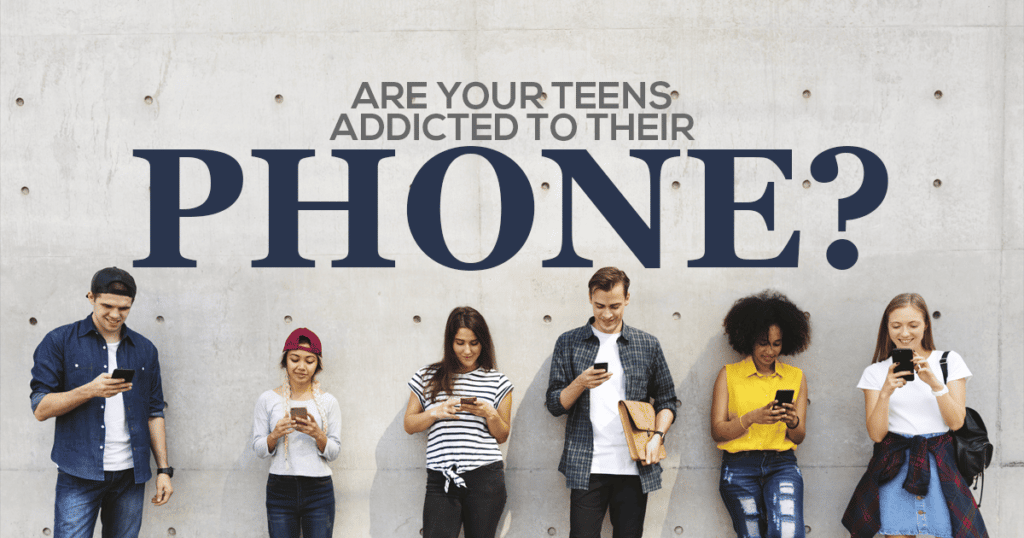Unfortunately, these days it’s quite common for teens to be addicted to their phones. While it might seem harmless, smartphone addiction can impair teens’ social and psychological development. Being on their phone or social media all the time can also be a potentially larger issue red flag.
On average, teens spend around seven hours a day on their phones. Of that, research shows they’re spending about three hours a day on social media. An estimated 20% of teens are on social platforms for more than five hours daily. This has inevitable effects on their daily lives, from their physical health to their mental well-being.
So why are these small mobile devices so compelling that we can’t seem to put them down?
Is Phone Addiction Real?
It can initially sound silly to say someone is addicted to a phone. In reality, think about how your teen reacts when they can’t find theirs or when they’re separated from their mobile phone. They can feel extremely anxious and distressed, much like someone with a substance addiction who can’t access whatever it is they’re addicted to.
Even though we’re talking about teens right now, it might be worth asking yourself, are you addicted to your smartphone too? You might exhibit many of the same behaviors as your teen without realizing it.
Phones are powerful, flexible tools, and it’s gotten to the point where many of us feel like we can’t live without them.
Pew Research Center says more than 80% of Americans own smartphones. That number was just 35% in 2011. Over the past few years, Google Trends shows that searches related to cell phone addiction have been searing.
While we know that excessive use of cell phones is a problem for teens and all age groups, does it meet the requirements to be defined as an addiction?
Currently, the Diagnostic and Statistical Manual of Mental Disorders (DSM) only recognizes one behavioral addiction: compulsive gambling. The DSM is the handbook the medical community uses for diagnosing mental disorders.
While the DSM might not include cellphone addiction yet, that’s not to say it won’t be in the future. There are a lot of overlaps between compulsive gambling and cell phone use.
Potential signs of teen cell phone addiction can include:
- Loss of control over behavior
- Having a hard time limiting the behavior
- Tolerance, meaning the need to engage in the behavior more to get the same feelings
- Negative consequences resulting from the behavior
- Withdrawal symptoms when the behavior isn’t practiced can include anxiety and irritability
- Relapse, meaning restarting the behavior after avoiding it for a period of time
There’s debate in the medical and mental health worlds right now about whether phone overuse is truly an addiction or perhaps can be better characterized as an issue with impulse control.
The Role of Dopamine in the Teenage Brain
There’s one potential link that we can identify between cell phone addiction and other types of addictions, which is the triggering of dopamine that occurs. Dopamine is a brain chemical. When you’re in a rewarding situation, dopamine is transmitted. Social interaction is one thing that can stimulate dopamine release.
When people use their phones as a tool for social interaction, they get a hit of dopamine when they connect with other people, particularly as social media users.
Social media app programmers know about the dopamine effect, and they design their platforms with that very thing in mind.
Based on social media addiction facts, people can develop addictive behavior related to seeing their likes and comments. Programmers will set them to release unpredictable patterns on social media posts. When something is unpredictable, you’re likely to check your phone more often.
While anyone is at risk of developing these addictive-like behaviors stemming from using cell phones and social media platforms, studies show that it’s most common in young people. Cell phone use peaks during the teen years and starts to decline after that.
An estimated 33% of 13-year-olds never turn their phone off, day or night. The younger someone is when they first get a phone, the more likely their use patterns will become problematic and affect their quality of life.
Personality traits and mental health conditions can increase the likelihood of becoming addicted to a phone or social media. These traits include low self-esteem and a lack of impulse control, being extroverted, having anxiety, or having a depressive disorder.
Researchers are quick to say it’s not always easy to discern whether the problems with cell phone overuse cause the conditions or the conditions themselves increase vulnerability.
Signs of Teens Addicted to Their Phones
Below are signs you might see in your teen regarding problematic phone use. You can also use these to answer the question of whether or not you might have a phone problem.
- Reaching for the phone immediately when being alone or bored
- Waking up multiple times in the night to check the phone
- Feeling anxious or upset without the phone
- The phone has led to an injury or accident
- Time spent using it is increasing
- The phone is interfering with schoolwork, relationships, or other important things in life
- Failing when trying to limit the use
The Effects of Phone Addiction
We often don’t think about how far-reaching the effects of phone addiction or dependence can be.
For example, teens are already the riskiest demographic of drivers. When they’re constantly focused on their phone, it can lead to roadway accidents.
Research also shows that people who overuse phones are at a greater risk of anxiety, depression, and insomnia. They’re also more at risk for conflicts in their relationships and poor academic or work performance.
If your teen is experiencing addiction to social media sites, and that’s why they’re always on their phone, it comes with even more possibly harmful effects in their real life.
For example, teens with constant social media users are more likely to have low self-esteem, feel isolated and lonely, and they are more likely to have decreased physical activity and poor academic performance.
Breaking the Addiction
For teens addicted to their phones, there may be a deeper problem. The problem may be worsening the dependence on the phone, or it could result from use.
Either way, it’s possible that your teen would benefit from mental health treatment and counseling.
For example, cognitive-behavioral therapy (CBT) is one approach that works well for teens. This therapy approach helps connect thoughts, behaviors, and emotions. It’s very effective for changing behavioral patterns.
There is even a bit of early research showing that participating in CBT can improve changes in brain chemistry linked to teens addicted to their phones.
Teens are facing unprecedented mental health challenges right now, and some of those may be made worse because of their constant connection to their phones and social media.
Luckily, there are things you can do as a parent, but it may require help from a professional counselor. If you’d like to learn more about mental health care for teens, we encourage you to contact the Hillside Horizon for Teens team today by calling 855-746-8378.




